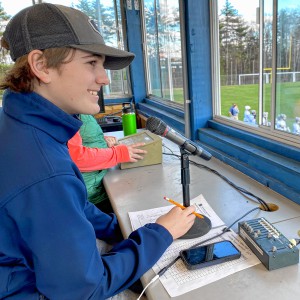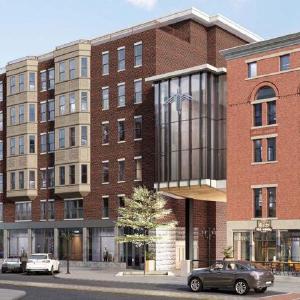NH senators consider college free speech bill

Keene State College students walk down Appian Way between classes on a fall day in 2021. Hannah Schroeder—Keene Sentinel staff photo
| Published: 04-10-2024 1:00 PM |
Backers of N.H. House Bill 1305 say it’s an important piece of legislation that is needed to ensure free speech rights are protected at public colleges.
Opponents say those rights are already guaranteed by the First Amendment, and that HB 1305 seeks to solve a problem that doesn’t exist.
Both viewpoints were presented in the N.H. Senate Education Committee Tuesday.
The House passed the bill, 206-169, on March 14, with most Republicans in favor and most Democrats against.
The legislation says campus outdoor areas “shall be deemed public forums for members of the campus community.”
HB 1305 has a section titled, “Freedom of Association and Nondiscrimination Against Students and Student Organizations” that seeks to prohibit discrimination against student organizations based on their viewpoints.
The bill also says colleges are entitled to set restrictions against behavior that constitutes harassment or seeks to provoke lawlessness. They could also set reasonable restrictions on the time, place and manner of free speech activities under the legislation.
Rep. Bob Lynn, R-Windham, spoke on Tuesday about why he thinks the bill is necessary.
Article continues after...
Yesterday's Most Read Articles
 Hometown Heroes: Couple’s sunflower fields in Concord reconnects the community to farming
Hometown Heroes: Couple’s sunflower fields in Concord reconnects the community to farming
 Boscawen resident takes issue with proposed town flag designs
Boscawen resident takes issue with proposed town flag designs
 Skepticism turns to enthusiasm: Concord Police welcome new social worker
Skepticism turns to enthusiasm: Concord Police welcome new social worker
 With new plan for multi-language learners, Concord School District shifts support for New American students
With new plan for multi-language learners, Concord School District shifts support for New American students
 With Concord down to one movie theater, is there a future to cinema-going?
With Concord down to one movie theater, is there a future to cinema-going?
 Opinion: The Concord School Board can restore trust with residents
Opinion: The Concord School Board can restore trust with residents
“I think it’s pretty common knowledge that First Amendment rights generally are under attack in this country and unfortunately they’re under attack in the places that we really should think is the last place that should occur, which is in academia, on our college campuses,” he said.
The nonprofit Foundation for Individual Rights and Expression conducted a survey of 55,102 undergraduates this year on 254 colleges to provide rankings for student free speech and open inquiry.
The University of New Hampshire was third highest in the rankings.
Paul Miller, a spokesman for Keene State College, which is a member with UNH of the University System of New Hampshire, said school leaders understand that “free speech matters” and is ”very much a point of emphasis.”
In a letter to the editor of The Equinox, the student newspaper at Keene State, college President Melinda Treadwell stressed the importance of free speech.
“We must create spaces where we can talk, strategize, and engage in actions to make a difference,” she said in the February letter. “We welcome all views, debate, and protest peacefully. Free speech and dialogue across differences are key tenets of our liberal arts tradition and our mission and values, as is fostering meaningful, threat-free discourse.”
In 2018, Keene State became the 42nd institution nationwide to earn the foundation’s “green light rating,” signifying that it does not have any written policies that imperil free expression. UNH and Plymouth State University, also part of USNH, also have earned that rating.
“At a time when too many schools muzzle campus expression, students and professors at Keene State should be proud to know that their school is fighting for their rights, not against them,” Azhar Majeed, the foundation’s vice president, said in a news release at the time.
“With the addition of Keene State, the state of New Hampshire is home to three green light schools and is quickly becoming a national leader in protecting student and faculty voices.”
Problems seen at some other schools included interfering with free speech rights by sanctioning students or scholars or by revoking invitations for certain people to speak on campus, the foundation said in its 2024 survey report.
Certain colleges have set up “free speech zones,” where people are allowed to speak, protest or gather signatures. The American Civil Liberties Union said on its website it opposes such zones on the basis that they serve to limit free speech activities elsewhere on campus.
Chad Pimentel, general counsel of the University System of New Hampshire, expressed concerns about HB 1305. He told the senators Tuesday that free speech activities are allowed generally on its campuses.
“USNH and its institutions are committed to free speech as guaranteed by the federal constitution and the constitution of the state of New Hampshire,” he said. “We already have policies that are fully compliant with the requirements of the First Amendment.”
He said UNH’s high ranking in the survey shows that free speech rights are being upheld at the institution.
“It means that tinkering with something that is clearly working may not be the best idea,” he said. “This bill appears to be a solution in search of a problem.”
But the bill’s prime sponsor, Rep. Daniel Popovici-Muller, R-Windham, said the bill is necessary to prevent problems from occurring in the future.
“Past performance is no guarantee of future results,” he said. “Things change. We have a duty to set standards and make sure that our institutions respect free speech permanently.”
The Senate Education Committee will eventually schedule a vote on whether to recommend that the full Senate pass HB 1305.


 Voice of the Pride: Merrimack Valley sophomore Nick Gelinas never misses a game
Voice of the Pride: Merrimack Valley sophomore Nick Gelinas never misses a game With less than three months left, Concord Casino hasn’t found a buyer
With less than three months left, Concord Casino hasn’t found a buyer Kearsarge Middle School drone team headed to West Virginia competition
Kearsarge Middle School drone team headed to West Virginia competition Phenix Hall, Christ the King food pantry, rail trail on Concord planning board’s agenda
Phenix Hall, Christ the King food pantry, rail trail on Concord planning board’s agenda
